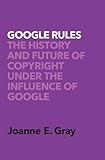Google Rules : The History And Future of Copyright Under The Influence of Google / Joanne Elizabeth Gray.
Publisher: New York : Oxford University Press, [2020]Description: xvi, 228 pages ; 25 cmContent type:- text
- unmediated
- volume
- 9780190072070
- 346.0482 GRA 23
- K1420.5 .G73 2020
| Item type | Current library | Shelving location | Call number | Status | Date due | Barcode |
|---|---|---|---|---|---|---|
 BOOKs
BOOKs
|
National Law School | General Stacks | 346.0482 GRA (Browse shelf(Opens below)) | Available | 38546 |
Table of contents
Preface;
Acknowledgements;
CHAPTER 1 A Brief History of Digital Copyright and Google: Politics, Ideologies and Agendas;
CHAPTER 2 The Value and Function of Copyright: Why the Copyright Debate Matters to us All;
CHAPTER 3 'Innovate First, Permission Later': Google's Copyright Policy Agenda;
CHAPTER 4 Google vs. The Copyright Tradition: Litigating 'Innovate First, Permission Later';
CHAPTER 5 The Problems of Google News in Europe;
CHAPTER 6 Google's Private Copyright Rule-Making and Algorithmic Enforcement;
CHAPTER 7 From Access to Monopoly: The Results and Complexities of Google's Copyright Logic;
CHAPTER 8 Conclusion: Achieving Public Interest Outcomes in a Digital Environment Dominated by Monopolistic Technology Firms
"Google Rules traces the rise of Google through its legal, commercial and political negotiations over copyright. The first part of the book shows how the public interest suffers in a digital copyright policy debate dominated by powerful industry stakeholders. The second part explores Google's contributions to digital copyright and the copyright policies that Google enforces across its own platforms. Increasingly, Google self-regulates and negotiates with media and entertainment companies to privately devise copyright rules. Google then deploys algorithmic regulatory technologies to enforce those rules. Google's private copyright rule-making and algorithmic enforcement limits transparency and accountability in digital copyright governance and privileges private interest and values over the public interest. Today, Google reigns over a technological and economic order that features empowered private actors and rapidly changing technological conditions. How to effectively regulate Google-in an evolving technological environment and in order to achieve public interest outcomes-is one of the most pressing policy questions of our time. Google Rules provides several strategies for taking up this challenge. While the parameters may be narrowly set upon one firm and one area of intellectual property law, ultimately, the book is a contribution to a much broader conversation about a new generation of monopolistic companies, born from the technological developments of the digital age, and the social, political and economic influence they have acquired in contemporary society"-- Provided by publisher.

There are no comments on this title.